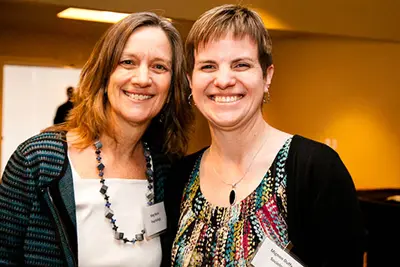Class Teaches Students How to Apply Professional Skills
 Image by Katharine Webster
Image by Katharine Webster
03/08/2022
By Katharine Webster
Every year, the Student Government Association (SGA) surveys undergraduate students to learn more about their most pressing needs and concerns, so it can advocate for university resources to address them.
And every year, Sociology Assoc. Prof. Mignon Duffy teaches Quantitative Methods in Social Research, a required course for sociology majors.
This year, the students in Duffy’s class teamed up with the SGA on the student survey, to the benefit of both. The survey topic: how students were adjusting to being on campus after more than a year of mostly virtual learning to prevent the spread of COVID-19.
 Image by Katharine Webster
Image by Katharine Webster
“I’ve always tried to have a service-learning component to this class, working with community organizations, but working with community partners is so limited right now because of the pandemic,” Duffy says. “This partnership is a win-win.”
Honors student Justin Baez Peguero, a business major and now chair of the SGA’s Academic Affairs Committee, says the sociology students brought a level of expertise that the SGA doesn’t have. He plans to keep the partnership going next year.
“It was amazing having their point of view and their collaboration on the survey, instead of our committee just cranking it out,” Baez Peguero says. “They actually know how to do a survey and how to word the questions, and I felt like the class could identify with the survey because it was meant for students like them.”
Baez Peguero, who was then vice-chair of the SGA committee, working with the chair, December 2021 graduate Eric Fan, came to Duffy’s class last September to explain what the committee was hoping to learn. The students then brainstormed more specific subtopics and divided into four teams to design questions.
The subtopics included how students’ mental health and financial well-being were affected by the pandemic; how they felt about in-person learning and the university’s COVID-19 policies; their academic and extracurricular engagement and sense of community; and how they thought those factors affected their academic success.
 Image by Katharine Webster
Image by Katharine Webster
The SGA committee went back and forth with the sociology students to refine the survey questions. After agreeing on a final version, the SGA sent the survey to all undergraduates last November – and got more than 2,500 responses from a cross-section of students that was representative across class year, college, gender, race, housing status and other variables.
The sociology students analyzed the results and presented their findings formally to representatives of the SGA; Dean of Academic Services Kerry Donohoe, who hatched the SGA-sociology class collaboration plan with Duffy; Brenda Evans, dean of student affairs and wellness; and Sarah Rine, director of student activities and leadership. Evans and Rine advise the SGA.
“At every step, as we learn a theory or conceptual step of survey design, we do it,” Duffy says. “It makes my students’ experience more meaningful and a better learning experience for them, because it has real impact.”
The students learned how to write survey questions to yield good data and then how to interpret that data. Kimani Brown, a junior sociology major, says that working on real-world research like a team of professionals was rewarding.
“It was really nice getting to do it yourself, but also having Prof. Duffy there to help,” she says. “Having one topic we could home in on allowed us to focus our energies.”
Brown’s team examined students’ sense of belonging and community through questions about how they were connecting both inside the classroom and through extracurricular activities, such as student clubs and sports. The team also looked at how students’ level of connection correlated to their own perceptions of their academic performance.
One finding that surprised Brown: She says that students’ sense of community was similar across colleges.
 Image by Katharine Webster
Image by Katharine Webster
“I found that very, very interesting, because I would have thought the community would be stronger in arts and humanities than in the sciences,” Brown says. “And I thought, ‘Now I want to dig deeper.’”
This semester, she’s getting a chance to do that in her qualitative research class.
Junior sociology major Jefferson Lopez says he learned a host of professional skills, such as how to use Qualtrics, a social science survey tool, and SPSS statistical analysis software, as well as how to present research findings. He also learned how to “turn any wandering thought into a research question,” and says he now understands the research methods behind sociological data.
“Sociology gives you tools to look at our world in a more informed and enriching way,” he says. “The most valuable thing about this class was that it gave me a new way to view things, and that will stay with me the rest of my life.”
Lopez’s team examined student stress and mental health, with a focus on attitudes around the return to in-person learning during the pandemic.
He says they found that, although most students were enjoying the return to in-person learning and felt well-protected by the university’s vaccination and masking policies, a substantial minority were nervous about being exposed to the disease because of personal health issues or because they were living with someone who was especially vulnerable.
Those nervous students said they were less likely to attend classes and that their academic performance was affected, he says.
“We have to acknowledge those students who don’t feel comfortable,” especially now that the university has lifted the indoor mask mandate, he says. “A lot of South Campus students are saying they’re going to keep wearing masks to keep everyone comfortable.”




